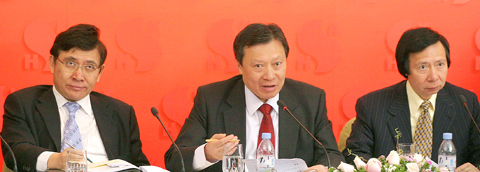Sun Hung Kai Properties Ltd (新鴻基地產), Hong Kong's biggest developer, replaced chairman Walter Kwok (郭炳湘) with his mother, seeking to end a feud that has gripped the city and split its second-richest family.
“Walter has ceased to be the chairman and chief executive of the company and has been re-designated as a non-executive director,” the company said in a filing to Hong Kong’s stock exchange. Kwong Siu-hing (鄺肖卿), 79, was appointed chairman, the company said. No chief executive officer was named.
Sun Hung Kai rose in Hong Kong trading after the decision, extending its rebound from a slump that had erased more than US$4 billion of market value. Walter, who became chairman in 1990 after his father’s death, lost a court battle yesterday to prevent a vote on his ouster, with younger brothers Thomas Kwok (郭炳江) and Raymond Kwok (郭炳聯). Walter, 57, also is suing his siblings for libel.

PHOTO: AFP
“The next question is how the company manages to deal with long-term arrangements,” said Nicole Wong, a property analyst at CLSA Ltd in Hong Kong.
The dispute has aired in court squabbles over the company that built Hong Kong’s tallest skyscraper and is the foundation of the Kwok family’s combined wealth of US$24 billion, second on Forbes Magazine’s list of Hong Kong’s richest only to Li Ka-shing (李嘉誠).
“Investors were obviously concerned about who’s going to be in charge,” Wilson Hung, an analyst at Hong Kong-based brokerage Quam Ltd, said before the announcement. “They were worried that if this keeps dragging on it will ultimately impact the company’s business.”
Sun Hung Kai rose 2 percent to HK$128.20 (US$16.42), heading for the biggest two-day gain in three weeks, as of 2:42pm in Hong Kong.
Listed on the Hong Kong stock exchange in 1972, Sun Hung Kai rode a three-decade surge in home prices to become the city’s biggest developer. Since Walter Kwok took over, the company’s value has ballooned 10-fold and the company now employs more than 27,000 people, its Web site said.
Walter Kwok said in a court filing that his brothers tried to remove him because he was suffering from mental illness. He said he doesn’t have any such disorder.
Walter, who has been on leave for personal reasons since Feb. 18, filed an injunction on May 15 to block the board vote.
Last Wednesday, he sued his brothers for libel, saying they had dubbed him a “liar,” a person of “low integrity” who made “unwise” investment decisions.
They have denied all the allegations.
Hong Kong’s Court of Appeal yesterday upheld a High Court ruling on Friday that canceled a temporary injunction blocking the meeting.
“This court simply cannot dictate to the board who should be their chairman,” Justices Rogers and Le Pichon said in Hong Kong’s appeals court yesterday.

WAITING GAME: The US has so far only offered a ‘best rate tariff,’ which officials assume is about 15 percent, the same as Japan, a person familiar with the matter said Taiwan and the US have completed “technical consultations” regarding tariffs and a finalized rate is expected to be released soon, Executive Yuan spokeswoman Michelle Lee (李慧芝) told a news conference yesterday, as a 90-day pause on US President Donald Trump’s “reciprocal” tariffs is set to expire today. The two countries have reached a “certain degree of consensus” on issues such as tariffs, nontariff trade barriers, trade facilitation, supply chain resilience and economic security, Lee said. They also discussed opportunities for cooperation, investment and procurement, she said. A joint statement is still being negotiated and would be released once the US government has made

Authorities have detained three former Taiwan Semiconductor Manufacturing Co (TMSC, 台積電) employees on suspicion of compromising classified technology used in making 2-nanometer chips, the Taiwan High Prosecutors’ Office said yesterday. Prosecutors are holding a former TSMC engineer surnamed Chen (陳) and two recently sacked TSMC engineers, including one person surnamed Wu (吳) in detention with restricted communication, following an investigation launched on July 25, a statement said. The announcement came a day after Nikkei Asia reported on the technology theft in an exclusive story, saying TSMC had fired two workers for contravening data rules on advanced chipmaking technology. Two-nanometer wafers are the most

NEW GEAR: On top of the new Tien Kung IV air defense missiles, the military is expected to place orders for a new combat vehicle next year for delivery in 2028 Mass production of Tien Kung IV (Sky Bow IV) missiles is expected to start next year, with plans to order 122 pods, the Ministry of National Defense’s (MND) latest list of regulated military material showed. The document said that the armed forces would obtain 46 pods of the air defense missiles next year and 76 pods the year after that. The Tien Kung IV is designed to intercept cruise missiles and ballistic missiles to an altitude of 70km, compared with the 60km maximum altitude achieved by the Missile Segment Enhancement variant of PAC-3 systems. A defense source said yesterday that the number of

Taiwanese exports to the US are to be subject to a 20 percent tariff starting on Thursday next week, according to an executive order signed by US President Donald Trump yesterday. The 20 percent levy was the same as the tariffs imposed on Vietnam, Sri Lanka and Bangladesh by Trump. It was higher than the tariffs imposed on Japan, South Korea and the EU (15 percent), as well as those on the Philippines (19 percent). A Taiwan official with knowledge of the matter said it is a "phased" tariff rate, and negotiations would continue. "Once negotiations conclude, Taiwan will obtain a better